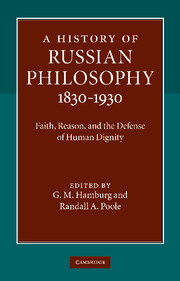
- Cited by 7
-
Cited byCrossref Citations
This Book has been cited by the following publications. This list is generated based on data provided by Crossref.
Semenenko, Irina 2013. The Quest for Identity. Russian Public Opinion on Europe and the European Union and the National Identity Agenda. Perspectives on European Politics and Society, Vol. 14, Issue. 1, p. 102.
Šaur, Josef 2015. Boris Nikolajevič Čičerin o ruských dějinách (státní škola jako historiografický a společenský fenomén).
Wang, Emily 2016. Viacheslav Ivanov in the 1930s: The Russian Poet as Italian Humanist. Slavic Review, Vol. 75, Issue. 4, p. 896.
Scott, Callum D. 2018. Aquinas and Solovyov: Unified Christian ontological-epistemology in critique of epistemic reductivism. Verbum et Ecclesia, Vol. 39, Issue. 1,
Bacon, Edwin 2018. Reflexive and Reasoned Religious Nationalism: The Exploratory Case of Russia. Politics and Religion, Vol. 11, Issue. 2, p. 396.
Rampton, Vanessa 2020. Liberal Ideas in Tsarist Russia.
Ljujić, Tatjana 2023. “Love Doesn’t Count Chromosomes”: Reflections on Disability, Law and Religious Ethics. Journal of Disability & Religion, Vol. 27, Issue. 3, p. 437.
- Publisher:
- Cambridge University Press
- Online publication date:
- June 2012
- Print publication year:
- 2010
- Online ISBN:
- 9780511712227


